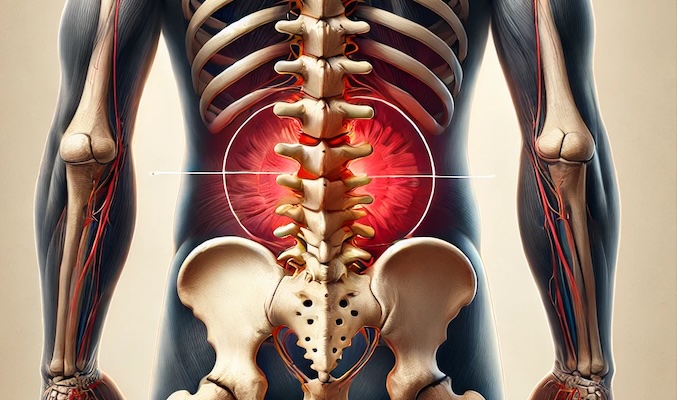
Herniated discs are a common condition that can cause significant discomfort and impair daily activities. At Precision Pain Care and Rehabilitation, we specialize in interventional pain management to help patients address this issue effectively and minimally invasively. Understanding what herniated discs are, how they affect the body, and how they can be treated through interventional pain management is crucial for finding long-term relief.
What is a Herniated Disc?
The spine comprises a series of bones called vertebrae, and between each vertebra lies a soft, gel-like cushion known as an intervertebral disc. These discs act as shock absorbers, allowing the spine to move smoothly and handle pressure. A herniated disc occurs when the disc's outer layer weakens or tears, allowing the inner gel-like material to bulge out. This can put pressure on nearby nerves, leading to pain, numbness, and sometimes loss of function in the affected area.
Common causes of herniated discs include:
- Degenerative Disc Disease: As we age, the discs naturally wear down, becoming more prone to herniation.
- Trauma: Sudden injuries, such as lifting heavy objects improperly or experiencing a fall, can cause a disc to herniate.
- Repetitive Strain: Activities that involve repetitive bending, twisting, or lifting can increase the risk of disc herniation.
Symptoms of a Herniated Disc
The symptoms of a herniated disc can vary depending on its location in the spine. Common signs include:
- Pain: This may be localized to the neck, and back, or radiate to the arms or legs. Sciatica, a common condition linked to herniated discs, can cause shooting pain down the leg.
- Numbness or Tingling: The pressure on the nerves can lead to numbness or tingling in the affected limbs.
- Muscle Weakness: A herniated disc may cause muscle weakness, affecting the ability to perform daily tasks.
The Role of Interventional Pain Management
Interventional pain management provides targeted treatment options that aim to address the root cause of pain, often without the need for surgery. At Precision Pain Care and Rehabilitation, we use advanced techniques to help manage the pain and improve the quality of life for those suffering from herniated discs.
Here are a few examples of interventional pain management techniques:
1. Epidural Steroid Injections
Epidural steroid injections are commonly used to reduce inflammation and relieve pain associated with herniated discs. These injections are administered directly into the epidural space around the spinal cord, allowing for targeted relief. Studies have shown that epidural steroid injections can provide significant pain reduction in many patients, often for months at a time.
2. Nerve Blocks
A nerve block involves injecting medication around a nerve or group of nerves to numb the area and provide pain relief. Nerve blocks can help determine the source of pain and offer immediate, albeit temporary, relief for patients with herniated discs.
3. Radiofrequency Ablation
Radiofrequency ablation (RFA) is another minimally invasive procedure that can help manage chronic pain from a herniated disc. By using radio waves to heat a small area of nerve tissue, RFA can effectively interrupt the pain signals being sent to the brain. This procedure can provide long-lasting relief, often for six months or more.
4. Spinal Cord Stimulation
For patients with chronic, debilitating pain from herniated discs, spinal cord stimulation (SCS) can be a viable option. SCS involves implanting a device that sends electrical impulses to the spinal cord to mask pain signals. This technique is particularly useful when other treatments have failed to provide sufficient relief.
Benefits of Interventional Pain Management for Herniated Discs
Interventional pain management offers several advantages for patients suffering from herniated discs:
- Minimally Invasive: Unlike traditional surgery, interventional techniques are typically performed on an outpatient basis, requiring only small incisions or injections.
- Targeted Relief: These procedures focus on the specific areas causing pain, providing faster and more effective relief.
- Quick Recovery: Most patients can return to their normal activities shortly after the procedure, with minimal downtime.
- Reduced Need for Opioids: By addressing the root cause of pain, interventional techniques can reduce or eliminate the need for opioid medications.
Success Rates and Data
Interventional pain management has shown to be an effective treatment option for many patients with herniated discs. According to research, over 70% of patients who undergo epidural steroid injections report significant pain relief, while more advanced techniques like spinal cord stimulation have high patient satisfaction rates, with over 85% of individuals experiencing meaningful improvements in their quality of life.
At Precision Pain Care and Rehabilitation, our focus is on providing individualized care to each patient. We understand that every case of a herniated disc is unique, which is why we offer a range of interventional pain management options tailored to meet each patient's specific needs.
Conclusion
Herniated discs can be debilitating, but with the right approach, they don’t have to be. Interventional pain management techniques offer effective, minimally invasive solutions that can provide lasting relief. At Precision Pain Care and Rehabilitation, we are committed to helping patients regain control of their lives and manage their pain with precision and care.
If you are experiencing symptoms of a herniated disc, contact us today to discuss your options for pain management and to learn more about how our advanced techniques can help you on the path to recovery.
Precision Pain Care and Rehabilitation has two convenient locations in Richmond Hill – Queens, and New Hyde Park – Long Island. Call the Queens office at (718) 215-1888 or (516) 419-4480 for the Long Island office to arrange an appointment with our Interventional Pain Management Specialists, Dr. Jeffrey Chacko or Dr. Sonny Ahluwalia.















